University President Michael K. Young stepped out from behind the desk and onto the stage of the Annenberg Presidential Conference Center to share on his experiences with democracy and the freedom of religion.
Young, who has a background in law and foreign policy that includes a stint as a cabinet member under former President George H.W. Bush, said religious freedom in foreign policy serves several functions vital to American prosperity Tuesday night.
“If you look across the globe you realize that the vast majority of people around the world identify in some way with religion, and that religion often drives how they think about their lives; how they think about what the most important things are in their lives; how they think about why they’re here on this Earth; how they raise their children; what is considered good, and what happens after they’re done with this life,” Young said. “They’re questions in the thinking of a large percentage of people, to the extent that when they’re not permitted to freely think about that, you really do stunt, in a powerful way, their capacity to realize their full potential as humans.”
Young said his interest in religious freedom peaked while working with the American effort to unify Germany.
“It gave me an opportunity to look at what had happened in countries that had themselves had particularly oppressing regimes, and how that in turn affected the people under those regimes,” Young said. “So many of these groups in Eastern Europe that had moved a nation with respect to challenging their government were really faith-based. Many of these movements had a really powerful religious undertaking.”
Religious freedom goes hand in hand with democratic government and consequently empowers citizens, calling it a “recipe for limited government” that in turn gives the government more legitimacy, Young said.
“If you allow lots of religious freedom, you are recognizing as a government the notion of limited government,” Young said. “You are prepared to say ‘Yes we acknowledge there is something that may hinder your allegiance that is above that of the state, and that’s okay.’”
Young said a vast majority of the world population lives in nations where religion is oppressed in some way, and that can in turn lead to social and economic instability.
“A recent study actually said that right now over 74 percent of the world’s populations live in countries that are categorized as having large levels of religious hostility and violence,” Young said. “That’s significantly more than was true even five years ago.”
Young said countries that allow more religious freedom tend to breed societies that work together more efficiently and provide the United States with better economic partners.
“Religion influences economic activity through its impact on individual traits that people have that make them more economically productive,” Young said.
Although the United States’ foreign policy addresses religious freedom in some ways, it is not as effective as it could be in others. Young said the United States could encourage more positive incentive for countries to enhance religious freedoms. A foreign policy that works to spread religious freedom as effectively as possible will enhance international relations as a whole.
“It creates economic activities that bind countries together, reduce conflict, reduce economic migration, create trade and business opportunities for all of us and bring us together in ways that allow cooperation across a broad range of geopolitical and economic activities,” Young said.
Young says religion drives prosperity in government
April 6, 2016
Photo by Photo by: Kevin Chou
As part of the former president George H.W. Bush’s cabinet, Young has a plethora of experience with government and religious freedom.
0
Donate to The Battalion
$1765
$5000
Contributed
Our Goal
Your donation will support the student journalists of Texas A&M University - College Station. Your contribution will allow us to purchase equipment and cover our annual website hosting costs, in addition to paying freelance staffers for their work, travel costs for coverage and more!
More to Discover










